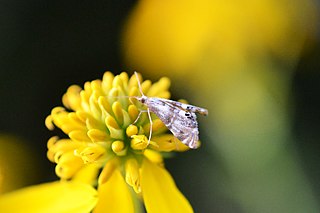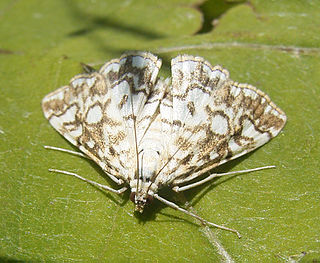
The Thyrididae comprise the family of picture-winged leaf moths. They are the only family in the superfamily Thyridoidea, which sometimes has been included in the Pyraloidea, but this isn't supported by cladistic analysis.

Crambinae is a large subfamily of the lepidopteran family Crambidae, the crambid snout moths. It currently includes over 1,800 species worldwide. The larvae are root feeders or stem borers, mostly on grasses. A few species are pests of sod grasses, maize, sugar cane, rice, and other Poaceae. The monophyly of this group is supported by the structure of the tympanal organs and the phallus attached medially to the juxta.

Aulacodes is a genus of moths of the family Crambidae. The genus was first described by Achille Guenée in 1854.

Bradina is a genus of moths of the family Crambidae.

Eoophyla is a genus of moths of the family Crambidae. It was erected by Charles Swinhoe in 1900.

Glyphodes is a genus of moths of the family Crambidae described by Achille Guenée in 1854.

Herpetogramma is a genus of moths of the family Crambidae described by Julius Lederer in 1863. It currently comprises 106 species and is found in North America, Eurasia, Australia, New Zealand, Central and South America. Of the few species where host plants are known, the larvae mostly feed on grasses.

Petrophila is a genus of moths of the family Crambidae. The genus was described by Lansdown Guilding in 1830.
Piletocera is a genus of moths of the family Crambidae. The genus was first described by Julius Lederer in 1863.

Hydrelia is a genus of moths in the family Geometridae erected by Jacob Hübner in 1825.

The Chrysauginae are a subfamily of snout moths. They are primarily Neotropical and include about 400 described species.

Arta is a genus of snout moths. It was described by Augustus Radcliffe Grote in 1875.
Arta calidalis is a species of snout moth in the genus Arta. It was described by George Hampson in 1906, and is known from Guatemala and Paraguay.
Antrodia serialiformis is a species of polypore fungus in the family Fomitopsidaceae. The fungus is resupinate, consisting of a fertile spore-bearing pore surface lying flat on the underside of decaying wood, although one or more fan-shaped overlapping caps may also be formed. Although quite common in the eastern United States, it was not recognized as a distinct species until 2009, owing to its resemblance to the closely related Antrodia serialis. Differences in ecology, spore size, and DNA sequences distinguish the two lookalikes.

Acentropinae is a fairly small subfamily of the lepidopteran family Crambidae, the crambid snout moths. Species of this subfamily are exclusively found in wetlands and aquatic habitats.

The borders of Greece from the Protocol of London from March 22, 1829 until the accession of the Dodecanese were changed nine times and its territorial extensions were seven.












